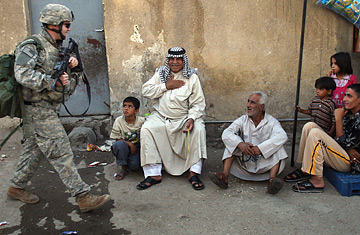
Army medic Sgt. Tad Myers from Jersey Shore, Pa., walks past a group of Iraqi civilians on September 11, 2007, in the Hurriyah neighbourhood of Baghdad, Iraq.
Last week's gloomy reports on U.S. progress in Iraq from a panel of retired officers and from the Government Accountability Office were followed by sunnier assessments by General David Petraeus. The commander of U.S. forces in Iraq spent nearly 18 hours testifying before four congressional panels on the start-and-stop advances being made by U.S. troops. And on Thursday night, President Bush told the nation that the progress cited by Petraeus will enable a small drawdown of troops, while still requiring a 130,000-strong U.S. military presence in Iraq for the indefinite future. But by the time the sun rose Friday, dark clouds — in the form of yet another pair of gloomy reports — had again returned to the picture in Iraq.
The latest downbeat assessments are the official White House report, mandated by Congress, on the progress of Iraq's government toward achieving 18 benchmarks set by the U.S. legislature, along with the State Department annual survey of religious freedom around the world. The White House report showed Baghdad improving in only one of the 18 benchmark categories — allowing members of Saddam Hussein's former ruling Ba'athist Party back into the Iraqi government. The religious-freedom report concludes that Iraq's "ongoing insurgency significantly harmed the ability of all religious believers to practice their faith," and found that believers of any stripe are subject to "harassment, intimidation, kidnapping, and killings" in their mosques and elsewhere.
The grim tone of the new studies contrasts starkly with the words of Bush and Petraeus this past week. While the pair acknowledged difficulties ahead, they stressed the 30,000-strong troop surge has made the country less violent and more stable, therefore justifying a continued and substantial U.S. troops presence. "The military objectives of the surge are in large measure being met," Petraeus said. "In the face of tough enemies and the brutal summer heat of Iraq, coalition and Iraqi security forces have achieved progress." President Bush, in his speech, proclaimed "the troop surge is working." Among his evidence was a statistic that carried echoes of Vietnam-era body counts. "Along with the Iraqi forces," he said, "they have captured or killed an average of more than 1,500 enemy fighters per month since January."
The sole benchmark moving from unsatisfactory in July to satisfactory in the latest report is what the White House calls "de-Ba'athification reform." That means, among other things, that more than 45,000 members of the once-banned Ba'athist party have been allowed to return to positions in the Iraqi government and military, or had their pensions restored.
Yet even that bit or progress highlights the continuing problem in Iraq of determining just who the enemies are. Before L. Paul Bremer took the reins of the interim government in Iraq two months after the invasion, then-Defense Secretary Donald Rumsfeld urged in a memo that the U.S. occupation administration "eliminate the remnants of Saddam's regime," including the dictator's "old enforcers — the Baath Party, Fedayeen Saddam, etc." Two weeks later, Bremer told Rumsfeld and Bush in a letter that "we must make it clear to everyone that we mean business: that Saddam and the Baathists are finished."
Friday's White House report carried a different message, embracing the Iraq Study Group's "support of re-integration of former Baathists... into civic life." The Bush Administration now "makes de-Baathification reform an integral part of the U.S. government's Iraq strategy" and hails "the re-integration of former Baathists taking place on the ground."
Former Ba'athists, of course, are hardly the only former enemies now being cultivated as friends in Iraq. The U.S. is now cooperating with many one-time Sunni insurgents, whom Rumsfeld famously denounced as "dead-enders," and there's a growing working relationship between the U.S. military and the Shi'ite forces commanded by Moqtada al-Sadr, whose Mahdi army is the most notorious of the Shi'ite militias. It's all part of a gradual redefining of what the Administration really means by success in Iraq.
